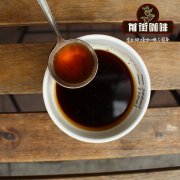Yemeni mocha boutique coffee Shanani Sanani producing area of the flavor characteristics and taste? The species of Mocha
Professional coffee knowledge exchange more coffee bean information please follow the coffee workshop (Wechat official account cafe_style)
Yemeni mocha boutique coffee Shanani Sanani producing area of the flavor characteristics and taste? What is the growing environment and history of Mocha?
Yemen, located by the Red Sea, is an ancient Arab country. Since ancient times, Yemeni coffee has been grown by itself, and the whole process of cultivation and treatment depends entirely on manual work. Coffee beans are naturally dried in the sun, and the beans are small and strong. Originated from the Yemeni city of Muke, so Yemeni coffee is mocha coffee. Yemeni coffee is a traditional high-quality coffee with a special clear taste, with a hint of wine flavor and natural sour taste. We choose Mattari No.9, which is recognized as the best, with rich texture, excellent meek taste, fruit-like sweet smell, and enjoy with you.
Origin: Matali (Mattari) producing area of Bany Matar province in northern Yemen < Yemen is a South-West Asian country. >
Height: 1000-3000 m
Quality: 100% Arabica beans, Mattari No.9, extremely high quality, traditional taste, mild beans, aroma glycol, slightly sour
The bean seed originated in Ethiopia. Drying treatment, solarization, manual removal of skin
Although Ethiopia is the birthplace of coffee, Yemen is the first Arab country to start growing coffee. Today, Yemen still grows coffee in the traditional way, which is not much different from the way it was used in 1600 AD. Coffee is grown at 3000 miles above sea level, and the diversion irrigation system built 400 years ago is still in use, which collects Rain Water and distributes limited water equally. Due to the limited source of water, all coffee is treated by the sun.
The name Mocha comes from the fact that early coffee was mainly exported from the port of Mocha in Yemen. Although the port was closed in 1800, the name mocha, used for coffee, continues to be used.
There are two main famous kinds of coffee: Mattari and Sanani. Mattari coffee is full-bodied and has a cocoa flavor. Sanani coffee is more wild and sour.
The Yemeni Sunani Sanani producing area (Sanani) is located in the capital area, where coffee is grown on terraces, and there is no data to verify the wild varieties. Shannani's biggest characteristic raw bean has a fermented wine aroma, which is not found in other countries after being calm and full of fermented wine.
Sanani production area of Mokasanni in Yemen
Farm farm name: Small producers small producing group
Grade grade: naturally dried Arabica beans, no regulatory body, no grading system
Region producing area: Sonani Sanani
Country countries: Yemen Yemen
Altitude altitude: 1650 m
Certification certification: without certification, all coffee is grown organically in accordance with the ancient method, and pesticides containing chemicals are not used.
Coffee Characteristics: coffee characteristics
Variety varieties: 10 special native mocha species are mainly Jaa'di,Taffahi and Dawairi.
Processing System treatment: Method Red ripe cherries dried on Africa Bed ripe cherry fruits were dried in an African (sun) elevated bed.
Harvest period harvest time: the main crop harvest period is from October to December, and the second harvest is in April in some producing areas.
Important Notice :
前街咖啡 FrontStreet Coffee has moved to new addredd:
FrontStreet Coffee Address: 315,Donghua East Road,GuangZhou
Tel:020 38364473
- Prev

What are the flavor and taste characteristics of Bani Matar in the Matali producing area of Yemeni mocha boutique coffee? Implant ring
Professional coffee knowledge exchange more coffee bean information please follow the coffee workshop (Wechat official account cafe_style) Yemen mocha coffee Matali producing area Bani Matar flavor and taste characteristics? Planting environment and history? Yemen is a traditional Muslim country. Yemen, located in the Arabian Peninsula, is known as the lady of coffee after coffee, compared with many in Ethiopia.
- Next

What are the flavor and taste characteristics of Yemeni mocha boutique coffee beans? The growing history of mocha beans? Rub
Professional coffee knowledge exchange more coffee bean information please follow the coffee workshop (Wechat official account cafe_style) Yemen mocha boutique coffee beans flavor and taste characteristics? The growing history of mocha beans? The spread history of mocha coffee? Yemen is located on the Arabian Peninsula of the Asian continent, very close to Africa as long as it crosses the Red Sea and the Gulf of Aden Gulf of Aden.
Related
- Detailed explanation of Jadeite planting Land in Panamanian Jadeite Manor introduction to the grading system of Jadeite competitive bidding, Red bid, Green bid and Rose Summer
- Story of Coffee planting in Brenka region of Costa Rica Stonehenge Manor anaerobic heavy honey treatment of flavor mouth
- What's on the barrel of Blue Mountain Coffee beans?
- Can American coffee also pull flowers? How to use hot American style to pull out a good-looking pattern?
- Can you make a cold extract with coffee beans? What is the right proportion for cold-extracted coffee formula?
- Indonesian PWN Gold Mandrine Coffee Origin Features Flavor How to Chong? Mandolin coffee is American.
- A brief introduction to the flavor characteristics of Brazilian yellow bourbon coffee beans
- What is the effect of different water quality on the flavor of cold-extracted coffee? What kind of water is best for brewing coffee?
- Why do you think of Rose Summer whenever you mention Panamanian coffee?
- Introduction to the characteristics of authentic blue mountain coffee bean producing areas? What is the CIB Coffee Authority in Jamaica?

